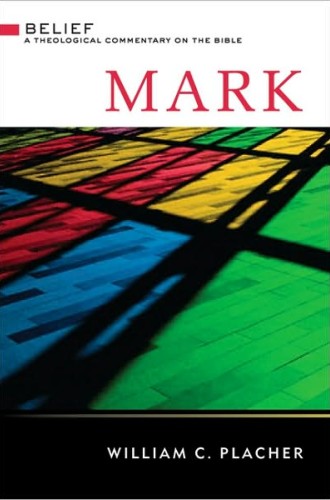Reading Mark theologically
If your commentary budget has not yet run dry, check out
William Placher's new book on the Gospel of Mark, the first in a new series of
theological commentaries from Westminster John Knox. Placher, who died in 2008,
was to be the co-editor of this series with Amy Plantinga Pauw. This volume,
the last thing he wrote, is a fitting legacy.
I appreciate a commentator with deep theological
sensitivity, someone who can build a bridge from the ancient text to the
present faith experience. Though a theologian by training and not a biblical
scholar, Placher demonstrates a keen understanding of the critical issues--but
without letting this overwhelm the text's theological insights. As he notes
(tipping his hat to Barth), critical scholarship is but the first step toward
commentary. In Placher's hands the text comes alive as he interacts with it in
the company of Augustine, Calvin and Barth.
Although Mark is the briefest teller of Jesus' story,
Placher suggests that we should attend to Mark's presentation because of its
historical, political, literary and theological perspectives. Mark's Gospel is
closest to Jesus' own lifetime; it demonstrates awareness of the political
issues of the day. While it might in some ways lack literary polish, its
storytelling is sophisticated. As for theology, in the text we encounter a God
who is a fellow-sufferer, one who understands our situation.
Placher takes us through Mark passage by passage, drawing
from other theologians as needed and offering occasional "further reflections"
on specific topics (Satan, ransom theory). The commentary begins by noting that
Mark's original audience was familiar with a "book that started with archē (beginning)." Mark's opening lines
suggest "a comparison between this story of a recently crucified teacher and
the story of God's creation of the whole universe, the beginning of God's
sacred Word." This gospel of a new beginning concludes with Mark's shorter
ending (16:1-8), which leaves us at the empty tomb, hanging, needing more
information.
Placher finds confirmation of the resurrection in Mark's
inclusion of the women as witnesses. But the end of Mark is consistent with
what Placher calls his "cryptic, dark theology"--which other gospel writers
couldn't tolerate. Mark ends without appearances or commissions, offering only
an ambiguity that might fit well our contemporary age, "when a Gospel that ends
with Christ triumphantly present is harder to reconcile with the horrors of the
world around us and doubts within us. Mark throws the ball to us, as he did to
his first readers." Having heard the story, it's our responsibility to keep it
alive in our lives and in our testimony.






